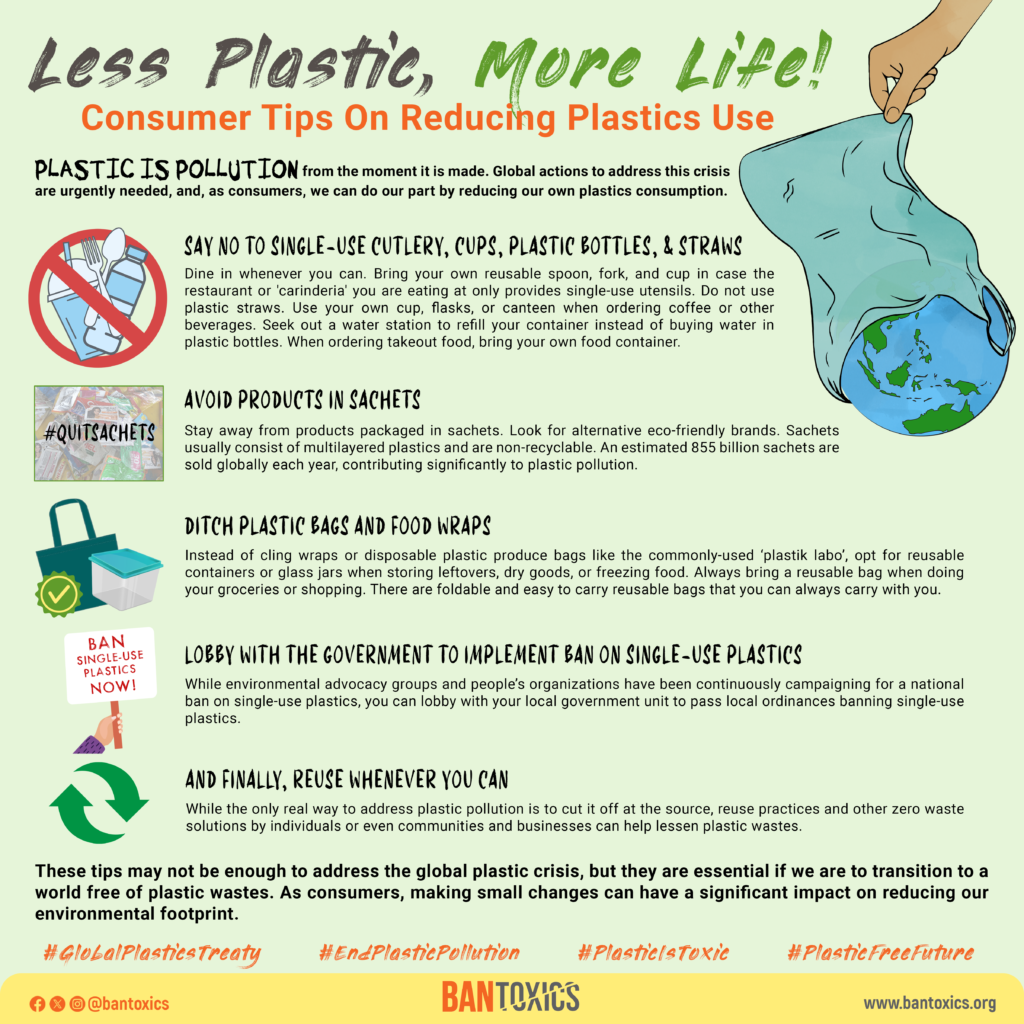As national government leaders are set to gather on April 23 to 29 in Ottawa, Canada for the fourth session of the Intergovernmental Negotiating Committee (INC-4) to develop a legally binding Global Plastics Treaty, we as consumers can also contribute to the fight to reduce plastics pollution.
Plastic is a growing crisis with devastating impact on the environment, human health, human rights, environmental justice, the rights of Indigenous Peoples, biodiversity, and climate. Numerous studies have revealed that plastic is ubiquitous, found not only in ecosystems and the atmosphere but also in the food we eat, the water we drink, and even inside our bodies.
According to a 2021 report by the World Bank Organization, the Philippines generates 2.7 million tons of plastic waste annually, 20% of which winds up in the ocean.
The United Nations Environment Programme (UNEP) meanwhile says that the persistence of plastic is a concerning issue, as most plastic items do not completely vanish, but instead, they degrade into increasingly smaller pieces. These microplastics can enter the human body through inhalation and absorption, accumulating in vital organs like the lungs, liver, spleen, and kidneys.
Everything about plastic’s lifecycle – from extraction to disposal – is toxic. Toxic chemical additives in plastics are also known to have persistent and bioaccumulative health impacts that may cause cancer, endocrine disruption leading to reproductive, growth, and cognitive impairments.
Plastic is pollution from the moment it is made. Global actions to address this crisis are urgently needed, and, as consumers, we can do our part by reducing our own plastics consumption.
Say No To Single-Use Cutlery, Cups, Plastic Bottles, & Straws
Dine in whenever you can. Bring your own reusable spoon, fork, and cup in case the restaurant or ‘carinderia’ you are eating at only provides single-use utensils. Do not use plastic straws. Use your own cup, flasks, or canteen when ordering coffee or other beverages. Seek out a water station to refill your container instead of buying water in plastic bottles. When ordering takeout food, bring your own food container.
Avoid Products in Sachets
Stay away from products packaged in sachets. Look for alternative eco-friendly brands. Sachets usually consist of multilayered plastics and are non-recyclable. An estimated 855 billion sachets are sold globally each year, contributing significantly to plastic pollution.
Ditch Plastic BAGS and Food Wraps
Instead of cling wraps or disposable plastic produce bags like the commonly-used ‘plastik labo’, opt for reusable containers or glass jars when storing leftovers, dry goods, or freezing food. Always bring a reusable bag when doing your groceries or shopping. There are foldable and easy to carry reusable bags that you can always carry with you.
Lobby with the government to implement ban on single-use plastics
While environmental advocacy groups and people’s organizations have been continuously campaigning for a national ban on single-use plastics, you can lobby with your local government unit to pass local ordinances banning single-use plastics.
And finally, reuse whenever you can
While the only real way to address plastic pollution is to cut it off at the source, reuse practices and other zero waste solutions by individuals or even communities and businesses can help lessen plastic wastes.
These tips may not be enough to address the global plastic crisis, but they are essential if we are to transition to a world free of plastic wastes. As consumers, making small changes can have a significant impact on reducing our environmental footprint.
#LessPlasticMoreLife #GlobalPlasticsTreaty #PlasticIsToxic #PlanetVsPlastics #ZeroWasteSolutions #EndPlasticPollution #StopToxicPlastics #EndPlasticPoison #PeopleNotPlastics #PlasticsImpactsMe #PlasticFreeFuture #BreakFreeFromPlastics

